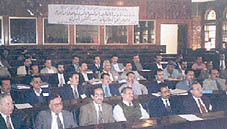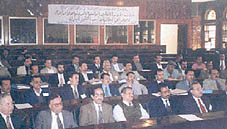
The Project Development of Bank Sector Training in Yemen(1998-2000) [Archives:1999/50/Business & Economy]
December 13 1999
By: Ismail Al-Ghabiri,
Yemen Times
The training course on new bank accounting standards and principles and in presentation of Banks’ Financial Statements was concluded Tuesday, December 7, 1999. The course was supported by the Institute of Banking Studies and the European Commission. The participants in this course have been trained in the preparation of financial statements and the standards of evaluation of banks in the Republic of Yemen according to international standards.
This course was one of the important courses in the Republic of Yemen which was carried out by the Banking Studies Institute under a TA contract to develop bank sector training in Yemen and which is financed by an EC grant.

To shed more light on this course and the benefits of it, Ismail Al-Ghabri of Yemen Times filed the following interview with Mr. Ahmad Abdul Rahman Al-Samawi, governor of the Central Bank of Yemen, Mr. Freund, the Head of the European Commission Technical Advisory Office in Yemen, Mr. S. P. Mangla, the Project’s Senior Banking Adviser and Training Expert, Mr. Zain Al-Saqqaf, general manager of the Institute of Banking Studies, Mrs. Nora Al-Adi, Financial Center and Analysis manager at the central bank and Mr. Abdul Al-Rahman Al-Hushaibri, general manager of Bank Auditing.
Q: Mr. Ahmad Abdul Rahman Al-Samawi, what was your impression of this course?
A: I first would like to extend my best thanks to Yemen Times, which is actively following up all the events that take place in our life. In regard to the course, I can say that it was successful by all means, for it was intended to accept one or two participants, at most, from each and every bank. However, banks presented requests that more than three or four join in this course. If the place was not that small, trainers could have reached sixty. This means that the participants have realized well its importance and benefits. Therefore, we feel confident to say that its fruits will be great and that it will be very helpful for them to understand their work. Furthermore, their knowledge in the unified and international accounting standards will be more comprehensive. Therefore, the Central Bank can play an important role in observing the other banks.
The European Commission has a praiseworthy constructive program and this was the beginning of an active participation which the Central Bank should have adopted. The European Commission has many courses with regard to banking, and it is also the institution that funded the course.
Q: What about other banks, such as the Housing Credit Bank, that are said to be privatized soon even though they are doing a good job, rendering commendable services and are so far successful ?
A: Nowadays the government has changed its role a lot. It used to be the main handler of the economy. However, now things have changed a lot. It plays the role of a lawmaker and an observer that the constitution is being abided by these rules and tenets of law. So privatization is the general trend of many countries all over the world. Therefore, the private sector should be given a chance to play its role in the development of the country.
Q: How has the Central Bank prepared for Y2K?
A: The Central Bank is one of the best prepared organizations which is concerned with this problem. The bank has different modern apparati; An apparatus called ” wing” is now replaced by new more modern ones that reached the bank in 1997. In my view, I believe that it will be difficult to solve the problem of Y2K of computers and this is what has been asserted by the company that we imported computers from and the company that exports software programs. Despite all this, we have taken different measures into consideration and have prepared a committee called the Emergency Committee. We have also made each branch of the Central Bank in all the governorates prepare an emergency plan in case the Central Bank comes to face this problem and can not cope with it. If this happens, then manual work will replace the machines. We are now performing experiments to check whether the apparati we have will cope with this problem or not.
Q: Mr. Freund, the European Commission is supporting the development of bank sector training in Yemen. Could you briefly outline the rationale and scope of your support to the sector and also explain the link between the Commission financed program and the course on international auditing standards, which is closing today here in Sana’a.
A: At present, a sizable part of European Commission assistance to Yemen is directed towards supporting a number of components of the government’s structural adjustment program as well as towards the social protection of those segments of the population who in the short and medium term are most likely to be negatively affected by the adjustment process.
Financial sector reform is one of the key pillars of the adjustment package and its success is considered a pre-requisite for stronger private sector development and thus growth and generation of employment. Under the financial sector reform program, new prudential banking regulations, for example, are encouraging banks to expand their hitherto narrow customer base while, at the same time, developing a much broader range of products. From 1999 onwards, Yemen’s banks will have to present their financial statements according to international accounting standards (IAS), thereby considerably improving the transparency of the sector. Financial service employees therefore need to meet the new skill requirements brought about by the reform, if the latter is to succeed.
The course on the principles of IAS held during this week here in Sana’a is part of a series of enhanced curricula offered by the institute of Banking studies (IBS) to the banking community in 1999. The cost of the course is covered by a EURO 750,000 pilot project which over a period of twenty four months provides technical assistance to IBS, and which includes the trainee program and provision of teaching aids.
The project anticipates that the IBS will design and deliver a range of customized service training courses for the banking community and moreover lay the foundation for a diploma and masters program in banking to be certified by a widely recognized body.
Q: Why did the EC pick the Institute of Banking Studies for this intervention?
A: The IBS is equitably financed and governed by the Yemen Commercial Bank, government specialized banks and the Central Bank of Yemen. It is therefore an ideal model for piloting the provision of vocational training based on the principles of the strict labor market orientation and financial sustainability.
Q: Mr. Zain Al-Saqqaf. How did you find this course?
A: This course is part of a program to develop the banking training signed between the European Commission and the Republic of Yemen represented by the Central Bank and the Institute of Banking Studies. This course is the first of this project to develop banking training in the Republic and is prepared by the Central Bank and the Institute of Banking Studies. The preparation of material and conduct of the training has been carried out by the establishment of KPMG and their partners in Sana’a and Cairo. The 30 trainees were from the different commercial banks, government specialized banks and Central bank of Yemen.
Q: What is the main objective behind this course?
A: The main objective behind this course is to train and qualify staffs at different banks and to help them understand the nature of the new unified accounting system according to the international standards to be applied to all the banks working in Yemen from the end of 1999.
Q: How do you assess the role of the European Commission in the field of banking training?
A: It is an undeniable fact that the technical as well as financial support presented by the European Commission deserves praise for it has helped a lot in helping the Institute to perform its mission to develop and train staff working in the different bank activities.
Q: Mr. S. P. Mangla, as an expert how do you assess this course and what is the nature of the technical assistance rendered to Yemen by the European Commission?
A: Having a work force which is trained and sufficiently motivated will benefit the banks. In the short term, responding to current business needs and new legislation, and in the longer terms, general skills improvement and further qualifications, thus improving the quality of the skills base of bank personnel, making them more flexible and productive.
Soon after the introduction of new bank accounting standards in Yemen, we were asked to meet the need to train bankers in these standards. Recognizing urgency, the EC program has been able to produce a highly-relevant training course for bankers. The course was never going to be easy for a number of reasons. However, the spirit of cooperation between the EC and Yemen has prevailed. Both wanted this and I thank the Governor, particularly, for his help and cooperation. Thanks are also due to his team, IBS general manager Mr. Al-Saqqaf and his team and, of course, our two instructors.
Q: Are there any new courses in the future?
A: This is one of a series of courses, identified following an in-depth training needs analysis. The Yemen bank sector training project is being financed by the European Commission, and will assist in training Yemen bankers in several topical subjects in the coming year.
EC support also includes strengthening of the Institute of Banking Studies, in terms of improving its capacity and capability, contributing to the development of the Institute as a sustainable professional institution for Yemeni bankers, which is able to raise the professional and commercial skills of bankers. You will have a more efficient banking system, ready to respond effectively to current reforms, and to contribute to its success.
Under the project, suitably qualified and committed Yemeni bankers, are being identified. They will receive training in modern banking practices, in Yemen and abroad, so that strengthening of IBS continues even after completion of this project, thus ensuring continuity. In his view, competition will intensify and many of the traditional professions will come under increasing pressure from a range of old and new providers of training and education. The IBS wants to work with other organizations, both in Yemen and abroad to draw on expertise and experience. So, we have a lot of work to do. We have made a good start, and we shall build on it.
IBS resources are limited, yet the demand for its services is increasing. In order to be able to meet needs, it will be necessary for the banking community and authorities to commit additional resources to IBS, so as to meet the evolving training needs of bankers, etc.
One of those who was trained in this course was Mrs. Nora Al-Adi, Financial Centers and Analysis manager at the Central Bank, who talked about the course and said, “For me this course is one of the very crucial ones which I have ever had. It helped me a lot in my work as to observing bank statements and correcting things if they are wrong. These standards are applicable to all the banks.
Q: Is training in the bank sector that important?
A: it is undoubtedly clear that training and qualifying is important especially in regard to banks. Such training should be applied in all the banks continuously.
Another trainer was Mr. Abdul Al-Rahman Al-Hushaibri, general manager of General Bank of Yemen’s Banks’ Auditing, who said that the course was extensive in the accounting standards and was very beneficial. It is great that we have unified accounting standards instead of having each bank come up with its own standards. I would like also to thank the European Commission for their support.
——
[archive-e:50-v:1999-y:1999-d:1999-12-13-p:./1999/iss50/b&e.htm]


